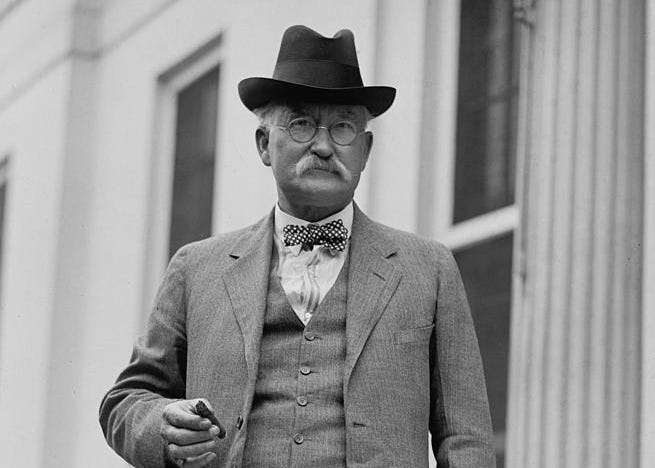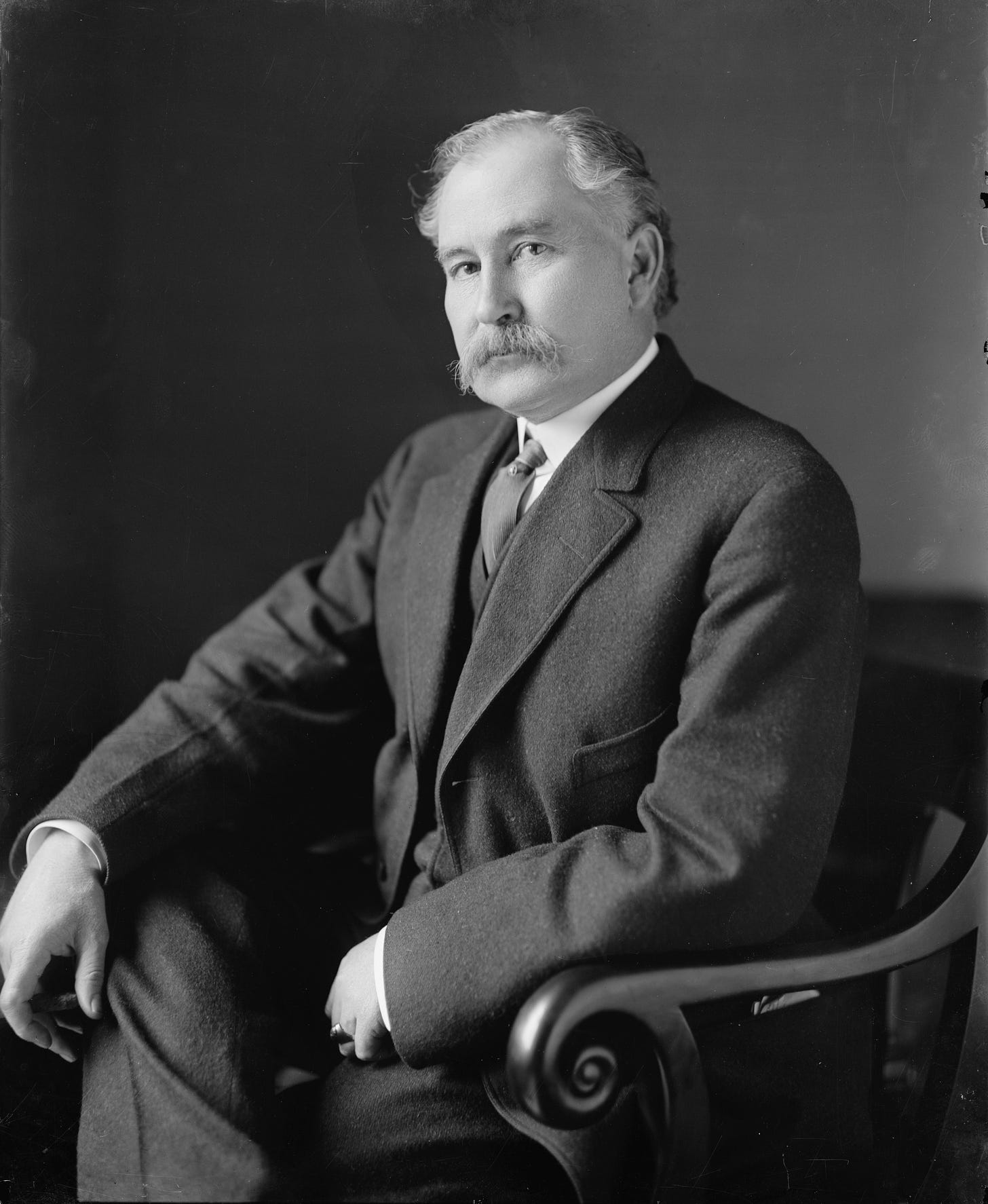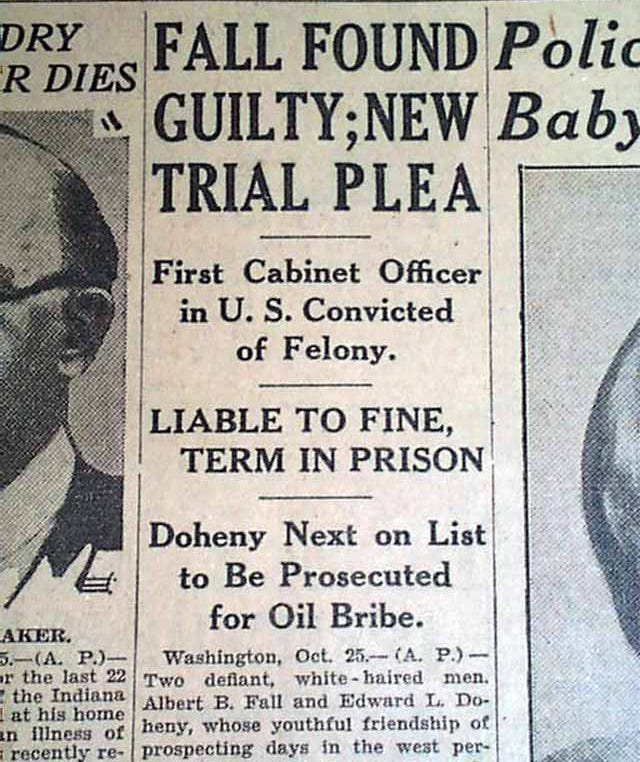October 25 - From Teapot Dome to Prison: A Cabinet Member's Unprecedented Fall
Confronting Corruption: Christian Duty in Governance
This is the day former Interior Secretary Albert B. Fall was convicted of accepting a bribe in 1929, becoming the first U.S. cabinet member to go to prison for crimes committed in office.
In today's lesson, we will delve into a pivotal moment in American political history that exposed the corrupt underbelly of 1920s governance. How does this scandal from nearly a century ago mirror contemporary political challenges? What does Scripture teach us about confronting corruption and maintaining integrity in positions of power?
"Nothing is covered up that will not be revealed, or hidden that will not be known." - Luke 12:2 (NIV)
This Date in History
In the brisk air of an early autumn day in 1929, the halls of justice in Washington D.C. buzzed with anticipation. Albert Bacon Fall, once a titan of American politics, stood before the court, his weathered face a mask of stoic resignation. As the gavel fell and the verdict was read, a collective gasp rippled through the courtroom. The former Secretary of the Interior was convicted of accepting a bribe, becoming the first U.S. cabinet member sentenced to prison for crimes committed while in office. This moment would forever alter the landscape of political accountability in America.
Albert Fall's journey to infamy began years earlier. A rough-and-tumble New Mexico politician, Fall had served as a U.S. Senator before being tapped by President Warren G. Harding to lead the Department of the Interior in 1921. This crucial government agency, responsible for managing federal lands and natural resources, would be comparable to today's Departments of Interior, Energy, and Agriculture combined.
Fall's downfall was inextricably linked to the Teapot Dome scandal, a web of corruption that would come to define the Harding administration. At the heart of the scandal were oil-rich lands in Wyoming and California, including one shaped like a teapot, hence the name "Teapot Dome." These lands had been set aside as emergency naval oil reserves in 1912, ensuring a stable fuel supply for the fleet in times of crisis.
In a controversial move, Fall convinced President Harding to transfer control of these reserves from the Navy to the Interior Department. What followed was a masterclass in political corruption. Fall secretly leased these valuable lands to private oil companies – Mammoth Oil Company (a front for Sinclair Oil Corporation) and Pan American Petroleum – without competitive bidding, a clear violation of the law.
The scandal began to unravel in April 1922 when a Wyoming oil operator, sensing something amiss, filed a complaint. Senate investigations soon followed, spearheaded by the tenacious Senator Thomas J. Walsh of Montana. As Walsh and his team dug deeper, they uncovered a trail of bribes totaling around $400,000 – an astronomical sum at the time – paid to Fall by oil executives Edward L. Doheny and Harry F. Sinclair.
Fall's trial was a sensation that gripped the nation. Despite his impassioned claims that the money was merely a series of loans, the evidence proved overwhelming. The jury found Fall guilty of accepting a bribe from Doheny, though in a twist of irony, Doheny was later acquitted of giving the bribe in a separate trial.
The conviction sent shockwaves through Washington and the entire country. It exposed the corrupt underbelly of 1920s politics and shattered public trust in government officials. President Calvin Coolidge, who had succeeded Harding after his death in 1923, found his administration tainted by association. The scandal became a rallying cry for government reform and played a significant role in the 1924 presidential election.
Fall's sentence included a year in prison and a $100,000 fine, a hefty punishment for the era. He began serving his term in 1931, his health rapidly deteriorating behind bars. Fall served nine months before being released early due to his poor physical condition. Upon his release, he retreated to his ranch in New Mexico, his once-promising political career in tatters.
The Teapot Dome scandal and Fall's conviction had far-reaching consequences. It led to important reforms, including the establishment of the Federal Oil Conservation Board and changes in laws governing naval oil reserves. More broadly, it reinforced the need for transparency in government dealings and stricter ethical standards for public officials.
Albert B. Fall passed away in 1944, a broken man, largely forgotten by the public he once served. Yet his legacy lived on in the form of increased scrutiny of government officials and a heightened awareness of the potential for corruption in high places. The case of Albert B. Fall serves as a powerful reminder of the corrupting influence of power and the critical importance of integrity in public service, a lesson that continues to resonate in American politics to this day.
Historical Context
The conviction of Albert B. Fall in 1929 occurred against a backdrop of significant social, economic, and political changes in the United States. The 1920s, often referred to as the "Roaring Twenties," was a decade of prosperity, technological advancements, and cultural shifts.
Economically, the country was experiencing a period of unprecedented growth. The stock market was booming, and new industries like automobiles and radio were transforming daily life. This era of apparent prosperity contributed to a sense of optimism and even complacency among many Americans, including those in positions of power.
Politically, the United States had just emerged from the progressive era, which had seen significant reforms aimed at curbing corruption and increasing government accountability. However, the election of Warren G. Harding in 1920 marked a shift towards more conservative policies and a "return to normalcy." This political climate, combined with the economic boom, created an environment where some officials felt emboldened to push ethical boundaries.
The Teapot Dome scandal and Fall's conviction came at a time when the role of government in managing natural resources was evolving. The conservation movement, championed by figures like Theodore Roosevelt, had led to increased federal control over public lands. However, there was ongoing debate about how these resources should be managed and who should benefit from them.
Socially, the 1920s saw significant changes in American culture. The rise of mass media, including radio and cinema, was changing how information spread and shaping public opinion. This played a crucial role in how the Teapot Dome scandal was perceived and reported across the nation.
It's worth noting that Fall's conviction occurred just days before the stock market crash of 1929, which would mark the beginning of the Great Depression. While these events were not directly related, they both contributed to a growing disillusionment with the political and economic systems of the time.
Did You Know?
The Teapot Dome scandal led to the first time Congress used its power to compel witnesses to testify in an investigation.
Today’s Reflection
As the gavel fell on Albert B. Fall's conviction in 1929, it sent reverberations through the halls of power that still echo in our corridors of government today. The Teapot Dome scandal, with its web of secret deals and brazen bribery, might seem like a relic of a bygone era. Yet, as we survey our current political landscape, we're confronted with an unsettling truth: the corrupting influence of power remains as potent as ever.
In the words of Jesus, "Nothing is covered up that will not be revealed, or hidden that will not be made known" (Luke 12:2 NIV). This divine promise serves both as a warning to those who might abuse their authority and as a call to vigilance for every citizen. Just as Fall's misdeeds were eventually brought to light, so too will the corrupt practices of modern politicians be exposed, whether through investigative journalism, whistleblowers, or the inexorable march of truth.
Today's political arena is rife with examples that mirror the Teapot Dome scandal in spirit, if not in exact detail. We see elected officials trading policy decisions for campaign contributions, regulatory agencies captured by the very industries they're meant to oversee, and public resources allocated based on personal connections rather than public good. These modern incarnations of corruption may be more sophisticated, hiding behind layers of legalese and lobbyist influence, but they are no less damaging to the fabric of our democracy.
As followers of Christ, we cannot afford to be passive observers of this corruption. The Apostle Paul reminds us that "our struggle is not against flesh and blood, but against the rulers, against the authorities, against the powers of this dark world" (Ephesians 6:12 NIV). This spiritual battle manifests in the temporal realm of politics and governance, calling us to active engagement rather than apathetic withdrawal.
But how do we confront corruption without becoming cynical or losing hope? First, we must recognize that our ultimate allegiance is not to any political party or figure, but to the Kingdom of God. This higher loyalty frees us to critique and challenge corrupt practices wherever we find them, even within our preferred political camps. As Proverbs 29:4 (NIV) wisely notes, "By justice a king gives a country stability, but those who are greedy for bribes tear it down."
Secondly, we must cultivate discernment. In an age of spin and misinformation, it's crucial that we "test everything; hold fast what is good" (1 Thessalonians 5:21 ESV). This means going beyond headlines and sound bites, digging deeper to understand the complex issues facing our nation, and holding our leaders accountable for their actions and decisions.
Finally, we must be willing to act. This might mean voting with integrity, even when it costs us something. It could involve peaceful protest against unjust policies or writing to our representatives. For some, it might mean running for office themselves, bringing Christian ethics into the heart of governance. Whatever form it takes, our faith must translate into action, for as James reminds us, "faith by itself, if it is not accompanied by action, is dead" (James 2:17 NIV).
The conviction of Albert B. Fall serves as both a warning and an encouragement. It warns us of the ever-present danger of corruption, reminding us to remain vigilant. But it also encourages us that justice can prevail, that light can pierce even the darkest corners of political machination. As we navigate the complex political realities of our time, may we be inspired to stand firm against corruption, to demand integrity from our leaders, and to embody the values of God's kingdom in every sphere of public life.
Practical Application
Commit to becoming a more informed and engaged citizen. Research the voting records and financial backers of your local and national representatives. Set up news alerts for key issues in your community and state. When you come across potential instances of corruption or ethical breaches, don't remain silent. Write letters to your representatives, attend town hall meetings, or support organizations that promote government transparency and accountability. Remember, your voice and actions matter in the fight against corruption.
Closing Prayer
Heavenly Father, we come before You humbled by the weight of our responsibility as citizens and believers. Grant us the wisdom to discern truth from deception, the courage to stand against corruption, and the perseverance to pursue justice. Help us to be salt and light in our communities and government, always remembering that our ultimate allegiance is to Your kingdom. May our actions reflect Your love and justice in this world. In Jesus' name, we pray. Amen.
Supplementary Study
"Woe to those who make unjust laws, to those who issue oppressive decrees, to deprive the poor of their rights and withhold justice from the oppressed of my people, making widows their prey and robbing the fatherless."
This passage underscores God's condemnation of corrupt governance, emphasizing the divine mandate for justice and the protection of the vulnerable in society.
"He who walks righteously and speaks what is right, who rejects gain from extortion and keeps his hand from accepting bribes, who stops his ears against plots of murder and shuts his eyes against contemplating evil—this is the man who will dwell on the heights, whose refuge will be the mountain fortress."
These verses provide a clear description of righteous leadership, contrasting sharply with the corrupt actions of Albert B. Fall and serving as a guide for ethical behavior in positions of power.
"For I know your manifold transgressions and your mighty sins: they afflict the just, they take a bribe, and they turn aside the poor in the gate from their right."
This verse directly addresses the issue of bribery and corruption, mirroring the actions of Fall in the Teapot Dome scandal and reminding us of God's awareness of such transgressions.
Final Thoughts
The conviction of Albert B. Fall serves as a timeless reminder that corruption, no matter how deeply hidden, will eventually come to light. As Christians, we are called to be vigilant guardians of integrity in our personal lives and in the public sphere. The fight against corruption is not just a political imperative but a spiritual one, rooted in our commitment to justice and righteousness. Let us take courage from the knowledge that our efforts to promote transparency and accountability align with God's desire for just governance and societal welfare.
Community Engagement
Share your thoughts or use these questions to get the conversation started.
What aspects of the Teapot Dome scandal do you find most shocking or relevant to today's political climate?
How can we, as Christians, balance our respect for governing authorities with our responsibility to confront corruption?
In what ways might you be tempted to overlook or justify corrupt practices when they benefit causes you support?
How can we cultivate a spirit of discernment and ethical leadership within our local communities and churches?
This devotional is free to read. You can support this publication by becoming a subscriber, upgrading to paid subscriber status, liking (this post, commenting, and/or sharing this post with anyone who might enjoy it.
In tomorrow's lesson, we'll dive into a story of visionary thinking that defied the skeptics and changed the course of a nation. Prepare to explore how seemingly foolish ideas can become transformative realities, both in history and in our spiritual lives.
Bonus - Did You Know?
Albert B. Fall was a lawyer and rancher before entering politics. He moved to New Mexico Territory in 1887, where he worked as a miner, rancher, and eventually became a lawyer.
The Teapot Dome oil field got its name from a rock formation that once resembled a teapot, complete with a spout and handle.
The $100,000 fine imposed on Fall would be equivalent to over $1.5 million in today's currency.
President Warren G. Harding, who appointed Fall, died in office before the full extent of the scandal was revealed.
Fall's defense team included former U.S. Senator Atlee Pomerene, adding to the high-profile nature of the trial.
Additional Resources
The Teapot Dome Scandal: How Big Oil Bought the Harding White House and Tried to Steal the Country - Laton McCartney
Teapot Dome: Oil and Politics in the 1920s - Burl Noggle
The Great Scandals of American History - Robert Jackson
The Rise of Warren Gamaliel Harding, 1865-1920 - Randolph C. Downes











Who says an old dog can't learn new tricks? I've always heard of the Teapot Dome Scandal, yet never had the energy to learn what it was. It's sad that we now have a government that murders its citizens and has hit men (e.g. Epstein murder0 on its payroll.
◄ Revelation 18:2 ►
New International Version
With a mighty voice he shouted: “’Fallen! Fallen is Babylon the Great!’ She has become a dwelling for demons and a haunt for every impure spirit, a haunt for every unclean bird, a haunt for every unclean and detestable animal.
Maybe a law against stock trading by government officials should be implemented, oh wait, they are the ones who make the laws. They all should use the prayer every morning.